Life & Faith
St. Helen, Mother of Emperor Constantine, Equal of the Apostles
 St. Helen was the mother of St. Constantine the Great, and was born at Drepanum (Helenopolis) in Asia Minor to parents of humble means. She married Constantius Chlorus, and their son Constantine was born in 274. Constantius divorced her in 294 in order to further his political ambitions by marrying a woman of noble rank. After he became emperor, Constantine showed his mother great honor and respect, granting her the imperial title “Augusta.”
St. Helen was the mother of St. Constantine the Great, and was born at Drepanum (Helenopolis) in Asia Minor to parents of humble means. She married Constantius Chlorus, and their son Constantine was born in 274. Constantius divorced her in 294 in order to further his political ambitions by marrying a woman of noble rank. After he became emperor, Constantine showed his mother great honor and respect, granting her the imperial title “Augusta.”
After St. Constantine became the sole ruler of the Western Roman Empire, he issued the Edict of Milan in 313 which guaranteed religious tolerance for Christians. St. Helen, who was a Christian, may have influenced him in this decision. In 323, when he became the sole ruler of the entire Roman Empire, he extended the provisions of the Edict of Milan to the Eastern half of the Empire. After three hundred years of persecution, Christians could finally practice their faith without fear.
Feast of Mid-Pentecost
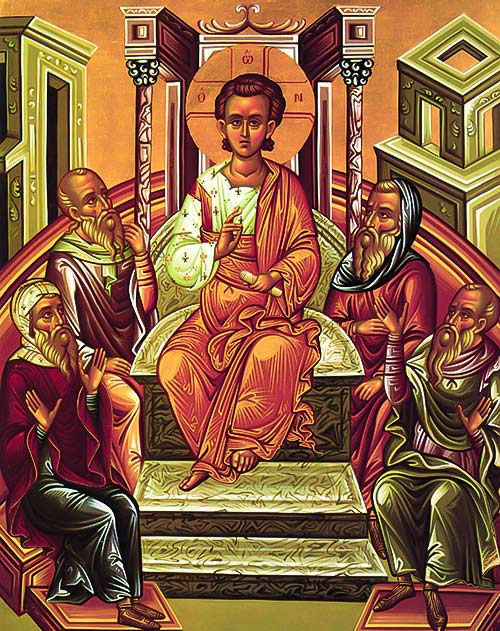 The fourth Wednesday after the Feast of Holy Pascha is commemorated as Mid-Pentecost. This feast marks the halfway point between Pascha and the Feast of Pentecost. As explained below this feast is closely linked to the Sunday of the Paralytic.
The fourth Wednesday after the Feast of Holy Pascha is commemorated as Mid-Pentecost. This feast marks the halfway point between Pascha and the Feast of Pentecost. As explained below this feast is closely linked to the Sunday of the Paralytic.
After the Saviour had miraculously healed the paralytic, the Jews, especially the Pharisees and Scribes, were moved with envy and persecuted Him, and sought to slay Him, using the excuse that He did not keep the Sabbath, since He worked miracles on that day. Jesus then departed to Galilee. About the middle of the Feast of Tabernacles, He went up again to the Temple and taught. The Jews, marvelling at the wisdom of His words, said, "How knoweth this man letters, having never learned?" But Christ first reproached their unbelief and lawlessness, then proved to them by the Law that they sought to slay Him unjustly, supposedly as a despiser of the Law, since He had healed the paralytic on the Sabbath. Therefore, since the things spoken by Christ in the middle of the Feast of Tabernacles are related to the Sunday of the Paralytic that is just passed, and since we have already reached the midpoint of the fifty days between Pascha and Pentecost, the Church has appointed this present feast as a bond between the two great feasts, thereby uniting, as it were, the two into one, and partaking of the grace of them both. Therefore today's feast is called Mid-Pentecost, and the Gospel Reading, "At Mid-feast"--though it refers to the Feast of Tabernacles - is used.
Venerable Ephraim the Syrian
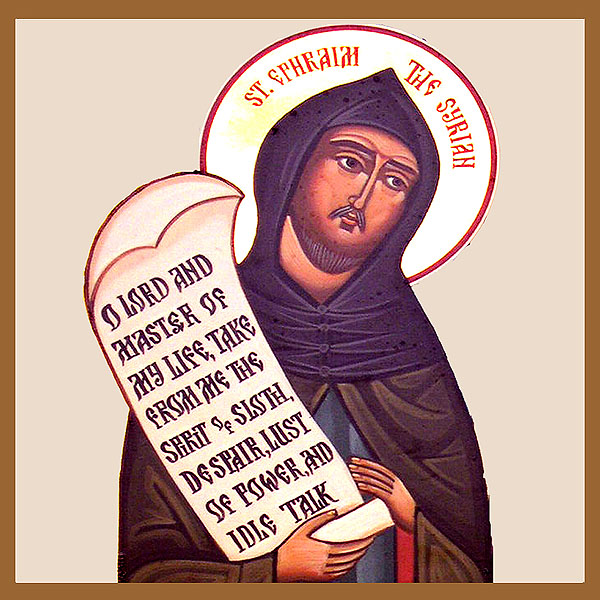 Saint Ephraim the Syrian, a teacher of repentance, was born at the beginning of the fourth century in the city of Nisibis (Mesopotamia) into the family of impoverished toilers of the soil. His parents raised their son in piety, but from his childhood he was known for his quick temper and impetuous character. He often had fights, acted thoughtlessly, and even doubted God’s Providence. He finally recovered his senses by the grace of God, and embarked on the path of repentance and salvation.
Saint Ephraim the Syrian, a teacher of repentance, was born at the beginning of the fourth century in the city of Nisibis (Mesopotamia) into the family of impoverished toilers of the soil. His parents raised their son in piety, but from his childhood he was known for his quick temper and impetuous character. He often had fights, acted thoughtlessly, and even doubted God’s Providence. He finally recovered his senses by the grace of God, and embarked on the path of repentance and salvation.
Once, he was unjustly accused of stealing a sheep and was thrown into prison. He heard a voice in a dream calling him to repent and correct his life. After this, he was acquitted of the charges and set free.
The Incarnation
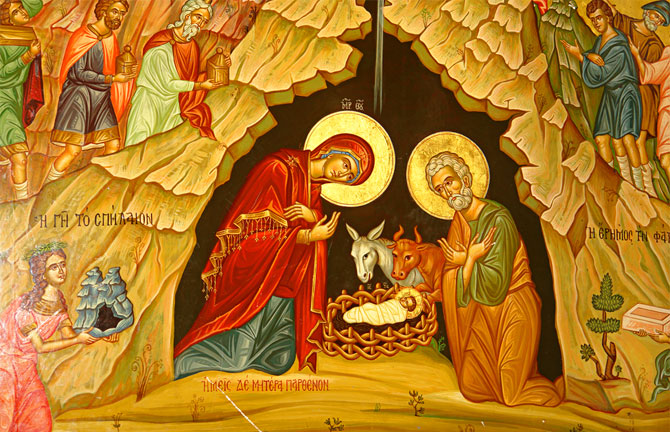 When we think that in a city like London there are so many little places where people gather for the feast and yet there are so many people who are in the street, in homes, in hostels, it is very painful. Probably none of you has experience of being in the street; I had it when I was a child and a youth, and it’s a very unpleasant feeling to know that you have nowhere to go and that you are totally unwanted in any of the places that shine with light, which obviously speak of warmth to you.
When we think that in a city like London there are so many little places where people gather for the feast and yet there are so many people who are in the street, in homes, in hostels, it is very painful. Probably none of you has experience of being in the street; I had it when I was a child and a youth, and it’s a very unpleasant feeling to know that you have nowhere to go and that you are totally unwanted in any of the places that shine with light, which obviously speak of warmth to you.
The Nativity sermon of St. John Chrysostom
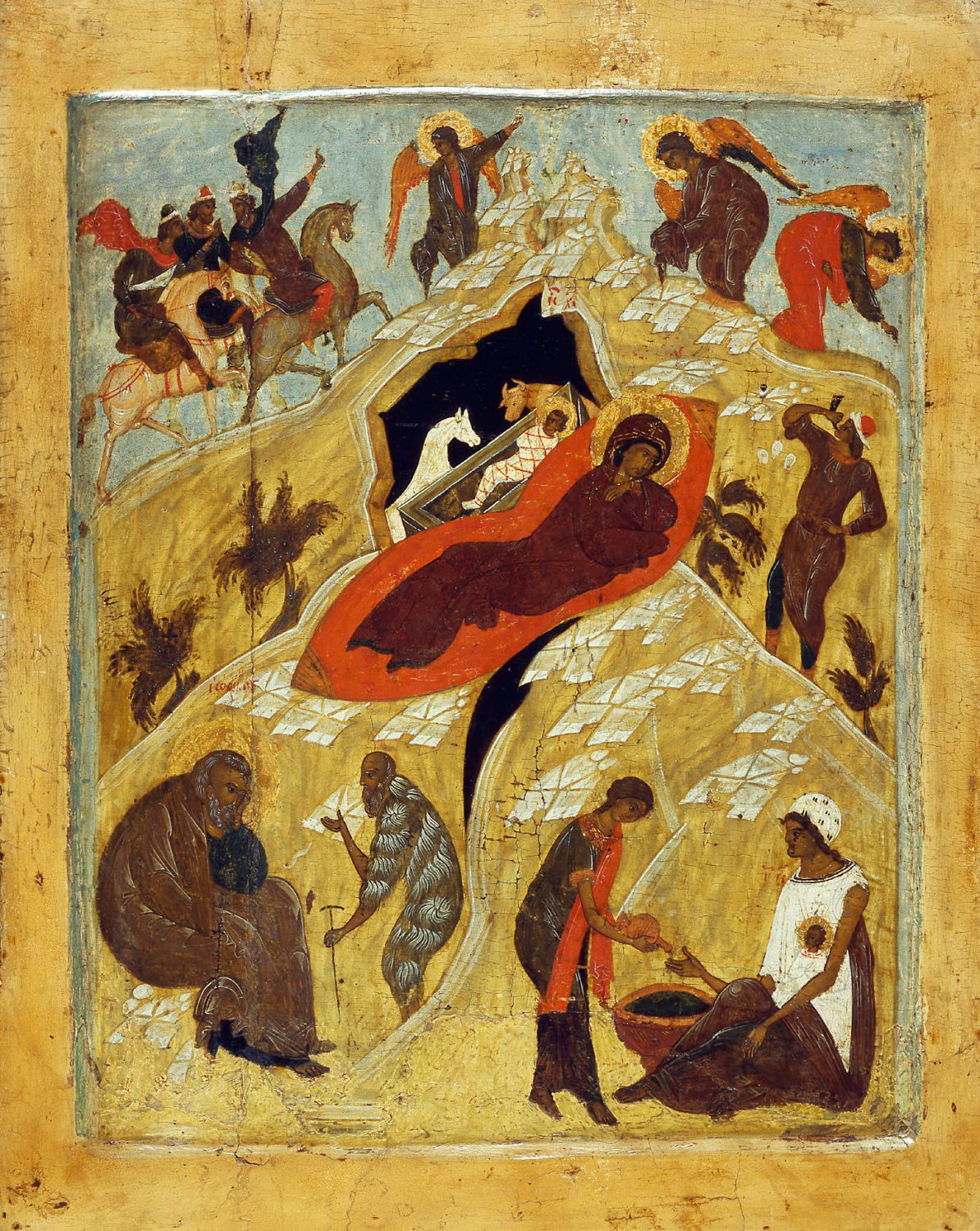 BEHOLD a new and wondrous mystery.
BEHOLD a new and wondrous mystery.
My ears resound to the Shepherd’s song, piping no soft melody, but chanting full forth a heavenly hymn. The Angels sing. The Archangels blend their voice in harmony. The Cherubim hymn their joyful praise. The Seraphim exalt His glory. All join to praise this holy feast, beholding the Godhead here on earth, and man in heaven. He Who is above, now for our redemption dwells here below; and he that was lowly is by divine mercy raised.
Bethlehem this day resembles heaven; hearing from the stars the singing of angelic voices; and in place of the sun, enfolds within itself on every side, the Sun of justice. And ask not how: for where God wills, the order of nature yields. For He willed; He had the power; He descended; He redeemed; all things yielded in obedience to God. This day He Who is, is Born; and He Who is, becomes what He was not. For when He was God, He became man; yet not departing from the Godhead that is His. Nor yet by any loss of divinity became He man, nor through increase became He God from man; but being the Word He became flesh, His nature, because of impassability, remaining unchanged.
Bodily Fasting for the soul's benefit
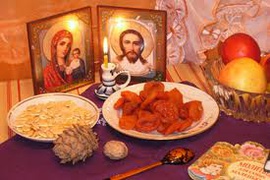 The Nativity fast begins on November 14/27, and lasts forty days. The Nativity fast is not as strict as Great Lent or the Dormition fast, and can be compared to the Apostle’s fast. It was instituted by the Church so that we would worthily greet the feast of the Nativity of Christ after having cleansed our hearts by prayer and repentance.
The Nativity fast begins on November 14/27, and lasts forty days. The Nativity fast is not as strict as Great Lent or the Dormition fast, and can be compared to the Apostle’s fast. It was instituted by the Church so that we would worthily greet the feast of the Nativity of Christ after having cleansed our hearts by prayer and repentance.

